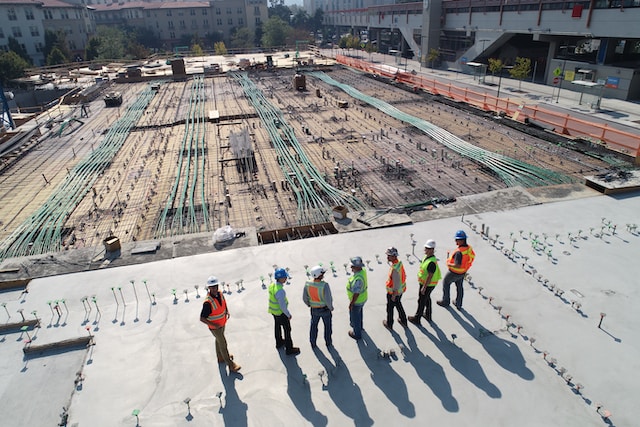Construction fleet management is pivotal in enhancing efficiency and profitability within the construction industry. With numerous vehicles, machinery, and personnel involved in various projects, managing and coordinating these assets is crucial for success. By implementing a comprehensive and strategic construction fleet management system, companies can streamline operations, reduce downtime, maximize productivity, and ultimately boost their bottom line. This article explores the key benefits and best practices associated with construction fleet management, shedding light on how industry professionals can harness this essential tool to drive success in their construction endeavors.
Comprehensive Strategies for Construction Fleet Management
Effective construction fleet management is essential for maximizing efficiency and profitability in the construction industry. With many vehicles, machinery, and personnel involved in different projects, it is crucial to have a comprehensive and strategic system to manage and coordinate these assets. By implementing such a system, companies can streamline their operations, minimize downtime, and increase productivity, ultimately leading to improved profitability.
One of the key benefits of construction fleet management is the ability to schedule and assign resources effectively. By having a central system that tracks the availability and location of vehicles and machinery, construction managers can optimize their use by assigning them to specific projects or tasks. This reduces the risk of underutilization or overloading of assets, ensuring that they are used to their maximum potential. Additionally, with real-time tracking and monitoring capabilities, construction fleet management can help reduce idle time and improve overall project planning and execution.
Another important aspect of construction fleet management is maintenance and repairs. With a large fleet of vehicles and machinery, it is crucial to have a proactive maintenance program in place to prevent breakdowns and costly repairs. A comprehensive fleet management system can provide automated maintenance schedules and reminders, ensuring that vehicles and machinery are regularly serviced and inspected. This helps to minimize unplanned downtime and increases the lifespan of assets, resulting in cost savings for the company.
In conclusion, construction fleet management is a crucial aspect of enhancing efficiency and profitability in the construction industry. By implementing a comprehensive and strategic system, companies can manage and coordinate their assets, optimize resource allocation, minimize downtime, and improve project planning and execution. This ultimately leads to increased productivity, reduced costs, and improved profitability.
Tools and Tips for Success
Construction fleet management is critical to ensuring success in the construction industry. Companies need to employ effective tools and tips to enhance efficiency and profitability. One essential tool is GPS tracking systems, which allow construction companies to monitor and track their fleet in real time. By knowing the exact location and status of each vehicle and machinery, companies can optimize routes, make informed decisions, and reduce idle time.
Additionally, telematics systems can provide valuable data on fuel consumption, vehicle diagnostics, and driver behavior. This information helps construction companies identify areas for improvement, such as reducing fuel costs and enhancing driver performance. By analyzing these insights, companies can make informed decisions that increase operational efficiency and profitability.
Another tip for success in construction fleet management is regular maintenance and inspections. Companies can prevent breakdowns and costly repairs by consistently maintaining vehicles and machinery, ensuring operations continue smoothly. Adhering to a thorough maintenance schedule, including routine inspections, oil changes, and tire rotations, is crucial for prolonging the fleet’s lifespan and minimizing unexpected setbacks.
In conclusion, employing GPS tracking systems, telematics, and regular maintenance practices is key to enhancing efficiency and profitability in construction fleet management. By implementing these tools and tips, construction companies can improve productivity, reduce downtime, and maximize their bottom line. Ensuring a well-managed and coordinated fleet is crucial for success in the ever-evolving construction industry.
Expert Advice for Seamless Construction Fleet Management
Several key factors must be considered regarding expert advice for seamless construction fleet management. First and foremost, investing in a comprehensive and strategic fleet management system that can effectively track and coordinate the various vehicles, machinery, and personnel involved in construction projects is important. This will help streamline operations, reduce downtime, and enhance productivity and profitability.
In addition to implementing a robust fleet management system, it is vital to establish clear communication channels and protocols within the construction team. This includes regular team meetings, training sessions, and performance evaluations to ensure everyone is on the same page and working towards the same goals. Effective communication will help promptly identify and address any issues or bottlenecks, improving efficiency and smoother project execution.
Furthermore, regular maintenance and inspection of construction vehicles and machinery are crucial for seamless fleet management. By scheduling routine check-ups and promptly addressing maintenance needs, companies can prevent breakdowns and costly repairs, minimizing downtime and maximizing productivity. Tracking fuel consumption and implementing fuel efficiency measures can contribute to cost savings and environmental sustainability.
Overall, expert advice for seamless construction fleet management emphasizes investing in a comprehensive fleet management system, establishing effective communication channels, and prioritizing regular maintenance and inspection of construction assets. By implementing these best practices, construction companies can enhance efficiency, reduce costs, and ultimately achieve greater profitability in their operations.


